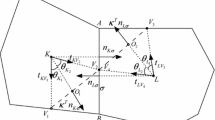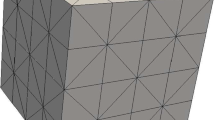Abstract
The MultiScale Finite Volume (MSFV) method is known to produce non-monotone solutions. The causes of the non-monotone solutions are identified and connected to the local flux across the boundaries of primal coarse cells induced by the basis functions. We propose a monotone MSFV (m-MSFV) method based on a local stencil-fix that guarantees monotonicity of the coarse-scale operator, and thus, the resulting approximate fine-scale solution. Detection of non-physical transmissibility coefficients that lead to non-monotone solutions is achieved using local information only and is performed algebraically. For these ‘critical’ primal coarse-grid interfaces, a monotone local flux approximation, specifically, a Two-Point Flux Approximation (TPFA), is employed. Alternatively, a local linear boundary condition can be used for the dual basis functions to reduce the degree of non-monotonicity. The local nature of the two strategies allows for ensuring monotonicity in local sub-regions, where the non-physical transmissibility occurs. For practical applications, an adaptive approach based on normalized positive off-diagonal coarse-scale transmissibility coefficients is developed. Based on the histogram of these normalized coefficients, one can remove the large peaks by applying the proposed modifications only for a small fraction of the primal coarse grids. Though the m-MSFV approach can guarantee monotonicity of the solutions to any desired level, numerical results illustrate that employing the m-MSFV modifications only for a small fraction of the domain can significantly reduce the non-monotonicity of the conservative MSFV solutions.
Article PDF
Similar content being viewed by others
Avoid common mistakes on your manuscript.
References
Hou, T., Wu, X.H.: A multiscale finite element method for elliptic problems in composite matrials and porous meida. J. Comput. Phys. 134, 169–189 (1997)
Efendiev, Y., Ginting, V., Hou, T., Ewing, R.: Convergence of a nonconforming multiscale finite element method. SIAM J. Numer. Anal. 37(3), 888–910 (2000)
Aarnes, J., Hou, T.Y.: Multiscale domain decomposition methods for elliptic problems with high aspect ratios. Acta Math. Appl. 18(1), 63–76 (2002)
Arbogast, T., Bryant, S.L.: A two-scale numerical subgrid technique for waterflood simulations. SPE J. 7, 446–457 (2002)
Chen, Z., Hou, T.: A mixed finite element method for elliptic problems with rapidly oscillating coefficients. Math. Comput. 72, 541–576 (2003)
Jenny, P., Lee, S.H., Tchelepi, H.A.: Multi-scale finite-volume method for elliptic problems in subsurface flow simulation. J. Comput. Phys. 187, 47–67 (2003)
Aarnes, J.E.: On the use of a mixed multiscale finite element method for greater flexibility and increased speed or improved accuracy in reservoir simulation. Multiscale Model. Simul. 2(3), 421–439 (2004)
Aarnes, J.E., Kippe, V., Lie, K.-A.: Mixed multiscale finite elements and streamline methods for reservoir simulation of large geomodels. Adv. Water Resour. 28(3), 257–271 (2005)
Efendiev, Y., Hou, T.Y.: Multiscale Finite Element Methods: Theory and Applications. Springer (2009)
Jenny, P., Lee, S.H., Tchelepi, H.A.: Adaptive fully implicit multi-scale finite-volume method for multi-phase flow and transport in heterogeneous porous media. J. Comput. Phys. 217, 627–641 (2006)
Lee, S.H., Wolfsteiner, C., Tchelepi, H.A.: Multiscale finite-volume formulation for multiphase flow in porous media: Black oil formulation of compressible, three-phase flow with gravity. Comput. Geosci. 12(3), 351–366 (2008)
Zhou, H., Lee, S.H., Tchelepi, H.A.: Multiscale finite-volume formulation for saturation equations. SPE J. 17(1), 198–211 (2011)
Zhou, H., Tchelepi, H.A.: Operator-based multiscale method for compressible flow. SPE J. 13, 267–273 (2008)
Hajibeygi, H., Jenny, P.: Multiscale finite-volume method for parabolic problems arising from compressible multiphase flow in porous media. J. Comput. Phys. 228, 5129–5147 (2009)
Hajibeygi, H., Tchelepi, H.A.: Compositional multiscale finite-volume formulation. SPE J. 19(2), 316–326 (2014)
Hajibeygi, H., Karvounis, D., Jenny, P.: A hierarchical fracture model for the iterative multiscale finite volume method. J. Comput. Phys. 230(24), 8729–8743 (2011)
Wolfsteiner, C., Lee, S.H., Tchelepi, H.A.: Well modeling in the multiscale finite volume method for subsurface flow simulation. SIAM Multiscale Model. Simul. 5(3), 900–917 (2006)
Jenny, P., Lunati, I.: Modeling complex wells with the multi-scale finite volume method. J. Comput. Phys. 228, 687–702 (2009)
Lee, S.H., Zhou, H., Tchelepi, H.A.: Adaptive multiscale finite-volume method for nonlinear multiphase transport in heterogeneous formations. J. Comput. Phys. 228(24), 9036–9058 (2009)
Hajibeygi, H., Lee, S.H., Lunati, I.: Accurate and efficient simulation of multiphase flow in a heterogeneous reservoir by using error estimate and control in the multiscale finite-volume framework. SPE J. 17(4), 1071–1083 (2012)
Hajibeygi, H., Bonfigli, G., Hesse, M.A., Jenny, P.: Iterative multiscale finite volume method. J. Comput. Phys. 227, 8604–8621 (2008)
Zhou, H., Tchelepi, H.A.: Two-stage algebraic multiscale linear solver for highly heterogeneous reservoir models. SPE J. 17(2), 523–539 (2012)
Wang, Y., Hajibeygi, H., Tchelepi, H.A.: Algebraic multiscale solver for flow in heterogeneous porous media. J. Comput. Phys. 259, 284–303 (2014)
Hajibeygi, H., Jenny, P.: Adaptive iterative multiscale finite volume method. J. Comput. Phys. 230, 628–643 (2011)
Hesse, M.A., Mallison, B.T., Tchelepi, H.A.: Compact multiscale finite volume method for heterogeneous anisotropic elliptic equations. SIAM Multiscale Model. Simul. 7, 934–962 (2008)
Lunati, I., Jenny, P.: Treating highly anisotropic subsurface flow with the multiscale finite-volume method. SIAM Multiscale Model. Simul. 6(1), 308–318 (2007)
Aziz, K., Settari, A.: Petroleum reservoir simulation. Blitzprint Ltd. Cagary, Alberta (2002)
Christie, M.A., Blunt, M.J.: Tenth SPE comparative solution project: a comparison of upscaling techniques. SPE Reserv. Eval. Eng. 4, 308–317 (2001)
Author information
Authors and Affiliations
Corresponding author
Rights and permissions
Open Access This article is distributed under the terms of the Creative Commons Attribution 4.0 International License (http://creativecommons.org/licenses/by/4.0/), which permits unrestricted use, distribution, and reproduction in any medium, provided you give appropriate credit to the original author(s) and the source, provide a link to the Creative Commons license, and indicate if changes were made.
About this article
Cite this article
Wang, Y., Hajibeygi, H. & Tchelepi, H.A. Monotone multiscale finite volume method. Comput Geosci 20, 509–524 (2016). https://doi.org/10.1007/s10596-015-9506-7
Received:
Accepted:
Published:
Issue Date:
DOI: https://doi.org/10.1007/s10596-015-9506-7




